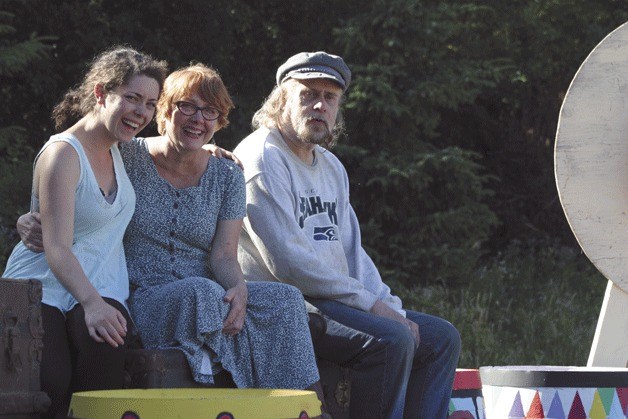Shakespeare in the tent is on for this August and September.
Thanks to the support and open wallets of Bard fans, more than $32,000 was raised for Island Shakespeare Festival.
However, if passersby missed seeing a 2,400-square foot, 18-foot-high tent behind Langley Middle School, it would be understandable.
Delivery of the tent is a few weeks behind schedule and slated for the end of July.
“Everyone will know when it goes up because it’s a big, big thing,” said Peggy Juve, the festival board’s president and development director.
A delay in raising the tent did not stall the 14-member cast’s preparations.
After all, the show must go on.
“We’ve always been used to being outdoors,” said Rose Woods, the festival’s founder and director. “Theater, for me, is whereever we are.”
“We’re not a tent. We bought a tent.”
The festival ran several years at the Chinook Institute’s StoryHouse Theater in Clinton.
Rose and the Island Shakespeare Festival moved to Langley this year, lured by what organizers said is easier access, ample parking, their own space and better visibility.
Past seasons of the free festival’s performances have maxed out around 300 audience members, a standing-room only crowd at StoryHouse.
The tent will be raised at the north edge of the lower field, framed by a green belt behind the stage at Langley Middle School.
At the field, the festival is off a main roadway, a short walk from the restaurants and inns in Langley and surrounded by parking options at the school and Island Church of Whidbey.
“Now there’s no excuse not to be there,” said Juve, adding that being in Langley means visitors can take the bus if need be.
“It’s really through the largess of the merchants who take out ads in our program.”
Having the tent paid in full, the stage bought and built and production costs covered was a major moment of relief for Juve, Woods and the board.
An online crowdfunding drive through the service Kickstarter brought in more than $20,000, about $5,000 more than what was originally requested by the festival. Juve, who was in charge of building a donor base, credited large donations from Nancy Nordhoff and Lynn Hayes.
Businesses which purchased advertising to underwrite this season’s production of “Much Ado About Nothing.” The tent cost $32,720; production costs were estimated around $18,000; and construction of the stage was $6,000.
Island Shakespeare Festival announced its venue change this spring, its organizers desiring an option that provided them flexibility of location but a permanent setting. A circus-style tent worked because they could perform on fields as long as it fit the 40-by-60 foot tent.
Organizers said they believe they can seat 200-300 guests inside the tent, and maybe even more on the fringes.
Even though the festival lost the designed acoustics of the amphitheater at StoryHouse, the organizers will not have amplification to the tent, though there will be lighting for the first time.
The first row will be within arms reach of the stage.
“It’s a very intimate environment,” Juve said. “If you lean over, you’ll be able to touch the stage in the front row.”
What began as a two-weekend festival in 2010 has grown into six weekends in its fourth season this year. Since its inception, the festival covered William Shakespeare’s hit plays such as “Romeo and Juliet” and “A Midsummer Night’s Dream.”
As an established festival, Woods envisions delving into The Bard’s lesser-performed works such as “Taming the Shrew” and “Richard III.” Organizers hope the festival can expand its run within a six-week period next season.
“I didn’t grow up with Shakespeare so much, and this has been a real education for me,” Juve said.
“Rose is a brilliant director and does a good job making it accessible to all.”


